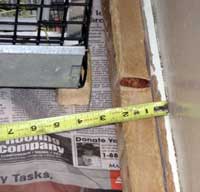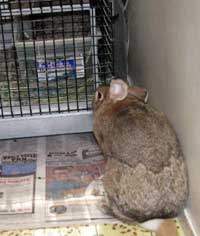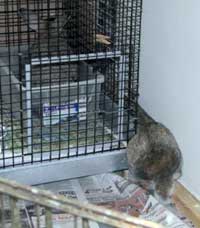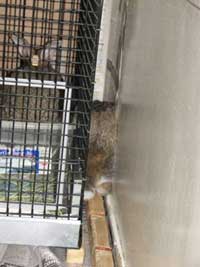
Rabbits have no fear gettting into the tightest spots
Tiny Space
Dennis sees an opening
There must be carrots back there!
Dennis squeezes in
Getting behind a couch or entertainment center is no problem.
Basic Information On Caring for Your Rabbit
Feeding
Like children, bunnies will overeat if given the chance. Don't give your rabbit unlimited pellets. He needs only 1/4 cup of pellets per 5 pounds of body weight each day. Look for high-fiber content (18% minimum) and low protein content (14% maximum) pellets, and avoid "mixes" that contain dried fruit, nuts, seeds, or beans.
It is also very important to give your rabbit unlimited amounts of timothy, oat, or grass hay. Hay aids in digestion and is the most important part of the bunny's diet. Alfalfa hay is too high in protein for adult rabbits; do not offer it to bunnies over 6 months old. Rabbits should also get a large handful of fresh, leafy greens each day. Add one new vegetable to his diet at a time, and eliminate it if it causes soft stools or diarrhea. Water can be given to your bunny in either a water bottle or a heavy crock. Whichever you use, change the water daily and remember to clean the container once a week.
Bunnies often act hungry, even when they're not. Remember, overfeeding leads to obesity! Treats should not be fed more than once a day, and may include a small piece of carrot, a slice of apple or pear, a few raisins, or a one-inch slice of banana. Never feed your bunny cookies, crackers, meats, cooked or fried foods, peelings, or spoiled greens.
Rabbits produce both fecal droppings (small, round, dry poops) and cecal pills (soft, partially formed droppings that may appear to be clustered). The rabbit must eat the cecal pills to complete the digestive process. Rabbits who stop eating, or who do not eat their cecal pills, should be seen immediately by a knowledgeable veterinarian.
Indoor Housing
All pet rabbits should have a safe haven within the human home, to protect them from the elements, predators, insects, and illness. Rabbits are often kept outside in hutches like livestock, but these bunnies do not thrive in isolation. They quickly become bored, depressed, and overweight.
Rabbits can live safely inside a human home if the right precautions have been taken. The bunny should have a cage or other area all to himself, where his food, water, and litterbox are located; but he should also be allowed to interact with the family and explore his surroundings when supervised. Mornings and evenings are active times when the rabbit is most likely to want to exercise. At night, he can go back in his cage.
back to top
A bunny's cage should be as large as possible, with room for the rabbit to rest, move around, and sit up on his hind feet. It should also be large enough to accommodate a litter box. If the cage comes with a wire floor, it should be covered with a board, mat, or carpet remnant. Bare wire flooring can lead to a painful condition called sore hocks.
Rabbits also need toys for exercise and mental stimulation. Try providing your bunny with pine cones, newspapers, cardboard tubes, untreated straw baskets, plastic slinkies, or hard plastic baby keys. Chewing on these items will also help wear down his teeth, which grow throughout his life. Do not give him chewable rubber or soft plastic items.
Rabbit-proofing your house is absolutely essential, both for your bunny's safety and for your own mental well-being. Electrical cords, wires, magazines left out on tables, and even the buttons on the television remote control can easily be mistaken for chewable toys! Remove tempting items from your bunny's reach, and cover all electrical cords with shower curtain covers, plastic tubes, or wire covers (see our bunny proofing page). If there are too many temptations, doorway baby gates are perfect for blocking off access altogether.
Here Dennis Hopper squeezes into a 4 inch wide space, while he is 8 inches wide at the hips.
If you choose to let your bunny play outside, he must be supervised at all times and restricted from areas that might contain pesticides, poisonous plants, or untrained animals. A well-trained family pet such as a dog or a cat might eventually be a fine companion for your bunny, but monitor their behavior around each other at first. Also keep an eye your bunny when he is around young children. Very young children might try to pick up the bunny, and the bunny will likely nip, scratch, or kick out of fear (rabbits usually dislike being held, but love to be petted around the ears and the top of the head).
back to top
Litter Training
People unfamiliar with house rabbits are amazed to hear that rabbits can learn to use litter boxes, just like cats. To litterbox train your rabbits, start by putting the box in the area of his cage that he usually uses for elimination. Place a few droppings or a piece of newspaper with the rabbit's urine in the box so he recognizes his scent. Add timothy hay to the box to entice him to jump in and eliminate while eating. Start by keeping the bunny and the box in the cage, and gradually increase his space as he masters using the box. It is a good idea to put out numerous litterboxes while is he learning. Remember: Baby bunnies and unneutered and unspayed bunnies will take longer to learn how to use the box. Be patient.
Fill the box with a non-clumping, non-toxic litter such as wood stove pellets, corn cob, hay, shredded newspapers, or recycled newspaper litters such as Carefresh or Yesterday's News. Avoid using clay cat litters, pine, cedar, or other softwood shavings, as these products can cause health problems in your rabbit.
back to top
Health Care
Rabbits are very clean animals; it is neither necessary nor advisable to bathe them (bathing can be very stressful and send them into shock). If your rabbit contracts fleas from other household pets, use a flea comb. Never use flea dip or a flea collar. The only safe topical insecticide for fleas on rabbits is Advantage. Other over-the-counter treatments will likely kill your rabbit.
Rabbits do not need vaccines or most other types of routine care, but a healthy rabbit should be checked annually. It is important to take your rabbit to a veterinarian who is experienced in working with rabbits. Rabbits are considered to be an "exotic" species, and not all vets have the necessary background to treat them properly. The Sacramento House Rabbit Society maintains a list of rabbit-savvy vets; call (916) 863-9690 to find one near you.
Symptoms of a rabbit health emergency can include not eating, not eliminating, or discharge from the eyes, ears, or nose. If you notice any of these symptoms, or if your rabbit seems to be acting strangely or not his usual self, make an appointment with the veterinarian right away.
back to top
The most important health decision you can make for your bunny is to have him or her spayed or neutered when he or she reaches the age of 3 to 6 months old. At this point, the bunny hits adolescence and becomes preoccupied with only one activity: mating. The bunny will "mark" territory, mount objects, and sometimes act aggressively and inappropriately. Spaying and neutering will not only relieve the bunny of his frustrations, but will also eliminate the extremely high risk of cancer found in unaltered rabbits. Once you have him or her altered, you might also consider getting another rabbit for companionship. Bonded rabbit "pairs" keep each other entertained and are less likely to get into trouble.
Like cats and dogs, there are far more rabbits born into the world than there are good human homes. Baby bunnies are adorable, but many of them may go to homes with humans who take them on impulse and tire of them later. These bunnies may be offered as "free to good home" which, again, can lead to impulse pets who will wind up lonely in a backyard hutch, dumped in the world, or as snake food for someone's pet boa.
Children generally do not maintain an ongoing interest in any kind of pet, and should not be expected to be the sole caretaker for a rabbit. An adult must be the primary caretaker and ensure that the pet's needs are met. Rabbits do grieve and they become depressed when they are neglected, abandoned, or given away.
When you bring home your bunny, give him some time to get used to the new surroundings. By adopting from this shelter, you have given him a second chance at life. By providing him with a safe, loving environment, he will repay you by blossoming into a delightful member of the family. If you have any questions about rabbit care, you can call the Sacramento House Rabbit Society at (916) 863-9690. We would love to hear from you!




